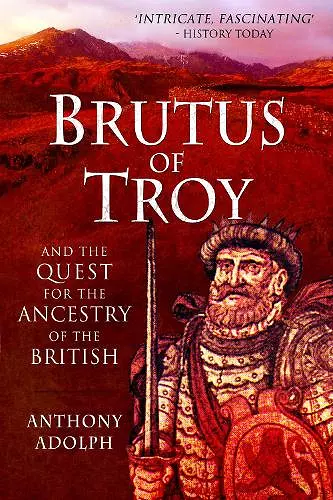Brutus of Troy
And the Quest for the Ancestry of the British
Format:Paperback
Publisher:Pen & Sword Books Ltd
Published:13th Oct '20
Should be back in stock very soon

The book covers the story of Britains search for its identity before and after the arrival of Christianity, leading up to the invention of the seeds of the Brutus myth in the 600s AD. It charts the development of his myth into a fully blown adventure story under the pen of Geoffrey of Monmouth in the 1100s. It then explores Brutuss story through the Middle Ages, as the centrepiece of Britains national consciousness and an important tool in royal and national propaganda and foreign policy (i.e. his myth was used as an excuse for invading Wales and Scotland). The book then charts the way his myth dropped out of mainstream politics and history after the Glorious Revolution of 1688 and lived on in a new afterlife in literature. Though no longer part of the way Britain sees itself now (though maybe this book will change that!), the Brutus myth has been used in many alternative theories about Britains origins and is still believed in by a small but hard core of Christians who see him as the divine instrument by which the ancestors of the Americans reached Britain in the first place
"...intricate, fascinating and densely written account of national identity and dreaming aspiration over 1,500 years... 'Blake's vision of Albion's capital conflated with the rebuilding of Jerusalem is a relatively late addition of the rich mixture of the Brutus myth... The list Adolph has quarried out of those who adopted the Brutus story as material for their own creations is a roll call of the great, the half-great, the eccentric and the obsessed', from Spenser and Milton down to Nahum Tate, Purcell, Pope, Blake and beyond, 'and in our time the pallimpset of the Brutus myth has burgeoned again in novels, with some Irish, transatlantic or Israeli extras added to it. Brutus is still there, beneath London's "dreaming hills". But on the evidence of Adolph's excellent book, sleep he does not'."--Barbara Jarvis "History Today" (6/1/2016 12:00:00 AM) "Anthony Adolph is a leading professional genealogist, with a strong interest in tracing family ancestors back as far as possible. As explained in some of his other works, the ancients, having no written sources to refer to, sought to determine their own family history by drawing on oral information handed down through the generations, along with legends and mythological stories, which formed the basis of their research. One of the greatest examples of oral history which we know, is that of the Trojan War as told by Homer, with Aeneas, the Trojan hero, who led refugees away from the burning city of Troy and who subsequently became a Roman hero in Virgil's Aeneid. This book seek to link the history of the British nation with Brutus of Troy, who was the ... great grandson of Aeneas... This is a fascinating and very enjoyable account of how our forefathers used the story of Brutus of Troy to link their ancestry to the narratives and legends of the past"--Barbara Jarvis "Genealogists' Magazine" (6/1/2016 12:00:00 AM) "It is immediately apparent that Anthony Adolph has exhausted every resource at his disposal. The conclusion of which lead to an extremely well researched publication...would definitely recommend it to anyone with an interest in both Classical and Medieval literature."-- "Ancient Origins" "On his last book, In Search of Our Ancient Ancestors, Anthony Adolph gave us a long view of genealogy, exploring the pedigree of the human race, and the British in particular, since primeval times. This book is a sequel in a sense, but now moves away from what science and history have told us into more mythological territory, to explore what might be described as the 'psychological ancestry' of the British. Here the story begins with the legendary figure of Brutus, whom the 9th century chronicler Nennius claimed gave his name to our islands. His account, as with so much of our earliest 'history', was then much embellished by Geoffrey of Monmouth in the 12th century. The result is a fascinating account of how the British people have mythologised themselves as 'New Trojans' - although Brutus (whom nobody today claims as a historical figure) is himself generally forgotten today, his legacy is certainly with us, every time we sing Jerusalem or visit a place claimed to be linked to King Arthur. READ IT FOR: A unique exploration of the ancient foundations of being British."-- "Your Family History" "The result of ten years research...this book probes deep into Brutus' origins, the growth of his legend and its hay day under the Tudor dynasty, and the subsequent fading of his story from mainstream consciousness, due largely to the rise of Britannia as a new embodiment of all that Brutus stood for- the very essence of the Island of Britain."-- "Reunite Magazine" completely recasts the notion of "ancient' ancestry by looking not at DNA. archaeology. or genealogical records, but at the history of an idea...This book, by exploring the literary history of the Brutus tradition, offers a lesson in how genealogy evolved as a Iiterary form, and how royal genealogy-real or fictitious-played an important part in the development of a national identity, both in Britain and in other countriesthat had their own parallel traditions--Barbara Jarvis "The American Genealogist" (6/1/2016 12:00:00 AM) Britain's History seen though its national myth"-- "The Telegraph"
ISBN: 9781526781802
Dimensions: unknown
Weight: unknown
240 pages